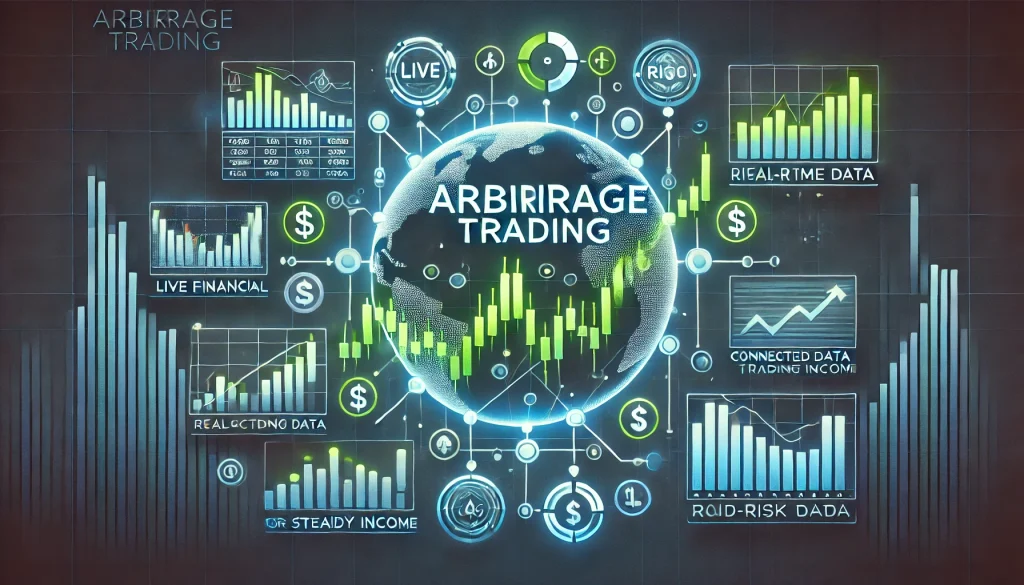Is Arbitrage Trading Worth the Risk? Find Out in Our Detailed Review
Arbitrage trading has grown popular as a low-risk, potentially high-reward approach for traders in Forex, stocks, and especially crypto markets. This method capitalizes on price discrepancies across different markets to generate profit. In this detailed review, we’ll explore arbitrage trading, breaking down the basics, pros and cons, and how it compares to other trading strategies. Whether you’re a beginner or an experienced trader, our goal is to provide the information needed to make an informed decision.

Overview
It is a strategic approach where traders capitalize on market inefficiencies by buying and selling the same asset at different prices across various exchanges or platforms. Unlike traditional trading, arbitrage relies on the opportunity to lock in profits with minimal risk, making it particularly appealing for traders who prefer a structured approach. By spotting price gaps and acting quickly, traders can earn profit without exposure to long-term price volatility.
Key Features of Arbitrage Trading
- Risk Management: Seen as a low-risk strategy due to price differentials rather than directional market moves.
- Asset Flexibility: Usable across various assets, from crypto to stocks and Forex.
- Time Sensitivity: Profits depend on the trader’s ability to execute trades quickly.
- Market Monitoring: Requires constant observation of multiple platforms or exchanges.
Arbitrage Trading Pros and Cons
Arbitrage trading comes with its advantages and drawbacks, depending on individual experience, the assets traded, and market knowledge. Here’s a quick look at both sides.
| Pros | Cons |
|---|---|
| Low-Risk Potential: Since traders exploit price differences, there’s minimal exposure to major losses. | Requires High Capital: Small price gaps mean that significant profits require larger capital investment. |
| Flexibility: Suitable for Forex, stocks, and crypto. | Execution Risk: Delays or market changes during trade execution can lead to losses. |
| Steady Profitability: Small but consistent returns through low-risk trades. | Transaction Fees: Multiple trades lead to accumulating fees, impacting overall profits. |
| Market Independence: Profits are not directly tied to asset price direction. | Complexity: Requires monitoring several exchanges and quick decision-making skills. |
Breaking Down Arbitrage Trading

Arbitrage trading may seem straightforward, but execution demands precision and insight into various market aspects, from crypto and stocks to Forex. Let’s dive deeper into key areas for a better understanding.
Risk Management
The primary appeal of arbitrage is its reputation as a “low-risk” strategy. In theory, traders buy an asset at a lower price in one market and sell it at a higher price in another, locking in a profit. However, risk management is crucial as unexpected market shifts, currency conversion fees, and delays can disrupt expected returns. To mitigate these risks, experienced arbitrage traders set strict entry and exit strategies.
Market Efficiency
Arbitrage relies on inefficiencies across markets. Since price differences can be fleeting, traders must be prepared to act quickly and monitor different exchanges. In crypto, for example, these inefficiencies occur more frequently due to varying levels of market maturity across exchanges. This creates opportunities for “cross-exchange arbitrage,” which involves moving assets across multiple platforms to capitalize on brief price gaps.
Technology and Execution
The benefits from automation, especially with advanced algorithms that scan multiple platforms for favorable trades within seconds. Some traders invest in trading bots that execute trades on their behalf, reducing the time lag and improving the chances of capturing profitable opportunities. However, while bots are highly effective, they also come with a learning curve and require regular adjustments to stay effective.
Profit Margins
This is typically characterized by small, consistent profits rather than large gains. The returns can be predictable but often require high trading volumes to become financially significant. In crypto, for instance, fees and withdrawal limits can affect net profit, necessitating a solid understanding of exchange policies.
Arbitrage Trading vs. Other Strategies – A Comparative Analysis
The differs from traditional trading strategies in various ways. Compared to more speculative methods, it’s seen as safer, though it does require unique skills and tools.
| Strategy | Risk Level | Potential Reward | Execution Requirements |
|---|---|---|---|
| Arbitrage Trading | Low | Moderate | Multiple exchange accounts, fast execution |
| Swing Trading | Moderate | High | Timing analysis, market trend knowledge |
| Day Trading | High | High | Full-time monitoring, technical analysis |
| Buy-and-Hold | Low to Moderate | High (long-term) | Minimal transactions, patience |

Unlike day trading or swing trading, where market predictions play a significant role, arbitrage primarily relies on real-time data and quick action. This makes it ideal for risk-averse traders focused on steady income rather than long-term investments. However, the capital requirement can make it challenging for beginners or traders without access to large funds.
Our Final Verdict on Arbitrage Trading
It offers a structured and potentially lucrative path for those who seek low-risk strategies with relatively stable returns. It is particularly suited for traders comfortable with technology and quick trade execution. If you’re willing to monitor multiple exchanges or invest in automated tools, arbitrage trading can be a reliable addition to your financial strategy. However, for those without the capital or experience, simpler methods like swing trading or buy-and-hold might be preferable.
Arbitrage Trading Rating
Overall Rating: ★★★★☆ (4/5)
Arbitrage trading scores highly for safety and consistent returns but loses a star due to high capital requirements and the complexity of fast execution.
FAQ
What is the primary advantage of arbitrage trading?
Arbitrage trading allows traders to profit from price discrepancies across markets, typically with lower risk than other strategies. This is possible because traders exploit short-lived price gaps rather than relying on the direction of market trends, making it a stable choice.
How much capital is needed for arbitrage trading?
The capital needed for arbitrage trading depends on the market. In crypto, for instance, higher volumes increase profit due to small price gaps. Many traders recommend starting with at least a few thousand dollars to see significant returns.
Can arbitrage trading be done with Forex and stocks as well as crypto?
Yes, arbitrage trading can be applied to Forex, stocks, and crypto, with each market offering unique challenges. In crypto, exchange rates vary widely, while Forex requires rapid response times. Stocks offer traditional arbitrage in more regulated markets.
Resources
- CoinDesk. Crypto Arbitrage Trading: How to Make Low-Risk Gains
- Medium. Exploring the World of Arbitrage: Strategies, Risks, and Rewards
- Eurekahedge. Arbitrage: A Limited-Risk Strategy
- KuCoin. Crypto Arbitrage: Complete Guide to Making Low-Risk Gains
- Investopedia. What Is Arbitrage?

